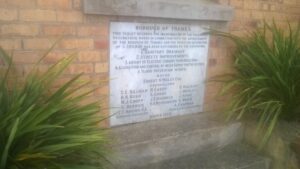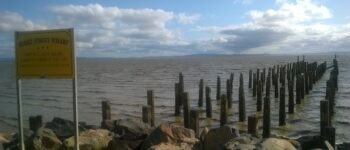1925: Burke Street Harbour Project
November 20, 2024
By AHNZ
 Today in history, 21 November, Thames Borough had an historic election which unseated Sidney Ensor from the Mayoralty he had held for an unprecedented 28 years. Not gone though, Sid was still serving as deputy mayor at the time of the goldfields centenary in 1967.
Today in history, 21 November, Thames Borough had an historic election which unseated Sidney Ensor from the Mayoralty he had held for an unprecedented 28 years. Not gone though, Sid was still serving as deputy mayor at the time of the goldfields centenary in 1967.
An interesting thing about the slogan of this losing campaign was the appeal to “Equal Rights for All, Special Privileges for None.” That’s 1950s New Zealand for you. Today that election slogan would not work at all. In the 2020s our politicians campaign on equal rights for none and quibble over which classes of society will get the Special Privileges! Indeed, when David Seymour tried to work toward equal rights for all this week he was met with a massive protest in Wellington. Ref. 35,000 arrive at New Zealand parliament to protest against controversial Māori treaty bill, Guardian (2024)
Sidney and Margaret Ensor served Thames Borough (1873-1975) as mayor and mayoress back in a time when that office really mattered. However, for the first 16 out of the 28 years Thames Borough was overseen by the Thames Borough Commissioners sent from Wellington. Initially for just 3 years, Big Government oversight stretched on until 1947. The Borough, you see, had experienced a catastrophic financial failure.
Ensor had inherited a borough that had gone from Economic Powerhouse to Bankruptcy in Sixty Years. When the big gold ran out Thames was no longer Auckland’s el dorado. In my own view the death knell was political. Thames deep mining relied on pumps keeping the water table down. When the Queen of Beauty mine’s pump shut down in 1914 the long reign it coincided with the end of Liberal regime. Thames, with its Lefty workers, were not friends of the new William Massey and Reform Ministry. The new Government had political power now and set about changing the guards. This pump and all that gold still waiting to be mined were denied permission to resume. However, once switched off, Thames could not be turned back on again.
 Rather than face economic reality, the Thames-ites started deficit financing public works projects. Like the Romans of old, they even erected this tablet (right) to commemorate their civic efforts. Sanitation, roading, electricity, flood protection, and they even ousted private enterprise to take over water supply. The Mayors leading up to Ensor (Miller, Rhodes, Bongard) kept spending borrowed money as if the gold rush had never ended.
Rather than face economic reality, the Thames-ites started deficit financing public works projects. Like the Romans of old, they even erected this tablet (right) to commemorate their civic efforts. Sanitation, roading, electricity, flood protection, and they even ousted private enterprise to take over water supply. The Mayors leading up to Ensor (Miller, Rhodes, Bongard) kept spending borrowed money as if the gold rush had never ended.
The Burke Street Harbour Project was the greatest government failure of them all. In an effort to Make Thames Great Again the locals allowed their politicians to promise an ambitious scheme: create a deep-water port capable of serving the new Hauraki Plains farming community, and that of the wider Waikato region, and providing an outlet for exports.
It failed.
‘When Mr Sydney Ensor was elected Mayor in 1931, he immediately approached the Prime Minister …and pointed out to him the Thames’ problems of public debt and diminishing valuations. The Prime Minister undertook to have the matter enquired into … When rates exceeded the earning capacity of the property, the position was hopeless, he said.’ (O’Neill 1973,) Wilton (2017)
“Central government’s response was to appoint a commissioner to manage the affairs of the borough…The commissioner control arrangement was originally only going to last until 1935 (i.e. three years) but remained in place until 1947. ” – ibid
“The couple had eloped, because Don’s parents, Sidney and Elizabeth Ensor, did not approve of their son marrying a Māori woman.” – Kura Ensor, Dictionary of New Zealand Biography (2022)
Well, sir, there’s nothing on earthLike a genuine, bona fideElectrified, six-car monorailWhat’d I say?MonorailWhat’s it called?MonorailThat’s right! Monorail – The Simpsons (1997)Thames “…lay sleeping, awaiting the magic kiss of a golden prince. It awoke to the warm breath of a cow licking its face. … It was very pleasant to be making money again, and it rather went to some heads. The borrowing twenties [1920s] were a time of super-optimism and loans all over the world, so Thames could hardly be blamed for joining in. Loans were floated to the tune of around £300,000. Much of this went on a sewerage scheme which was needed and useful. £66,000 was for a harbor scheme, which was thought to be needed, but proved quite useless.’ (Isdale 1967,) Wilton (2017)
“I’m Mr. Bad Example, intruder in the dirt
I like to have a good time, and I don’t care who gets hurt
I’m Mr. Bad Example, take a look at me
I’ll live to be a hundred and go down in infamy” – Warren Zevon (1991)
The expense essentially made the Borough bankrupt. This is why Ensor, as soon as he was elected in 1931, had to go cap-in-hand to new Prime Minister George Forbes. However, it wasn’t thus Thames that had pursued an irresponsible ‘roaring twenties’ but other towns too and the Dominion as a whole. Forbes was staring down an Economic Crash. Big Brother would ‘help’ but the strings attached turned out to be making Thames sock-puppet for 16 years. The egotistical townsfolk who would not spend according to their earnings had gambled their democracy and lost it.
I’m an Anarchist. I have no time for governments, large or small, thinking they can build things or run things or make things or improve employment. The only thing government ever does is wreck markets. The examples are unending. How many times do New Zealanders need to re-learn that schemes like this always turn to muck?
In its defence, Thames has erected a sign beside the unsightly skeleton of the aborted Burke Street Harbour. It states that £66,000 were tipped into the Firth of Thames and that silt defeated the project. It’s true that, up river, the Hauraki Swamps were were being drained to create the Hauraki Plains for farming. That had some downstream effects on Thames big ambition for a deep water port.
However, I agree with David Wilton who attributed the failure on parochialism, and nostalgia for the halcyon days “when Thames was a national economic powerhouse.” The Vogel Adventure generation were in Mid-Life in the 1920s and occupied the positions of power in industry and politics. Having grown up in prosperous times (First Turning: Provincial High) they had expectations of affluence but no particular expectations of having to earn it. They expected ‘a country fit for heroes’ and sent off their kids to die in the Great War to bring that about.
For the Boomers of Thames it was their pride and their right to be great again, as they were in the good old golden days. It wouldn’t have taken much for a fast-talking politician with the right instincts for exploitation to talk the folks into an expensive white elephant. We don’t even know who that was but he made off like a bandit.
—
Image ref. AHNZ Archives (September 2019, 2024)
Like Comment Share
Anarchist History of New Zealand: Every government is a parliament of whores. The trouble is, in a democracy, the whores are us.





